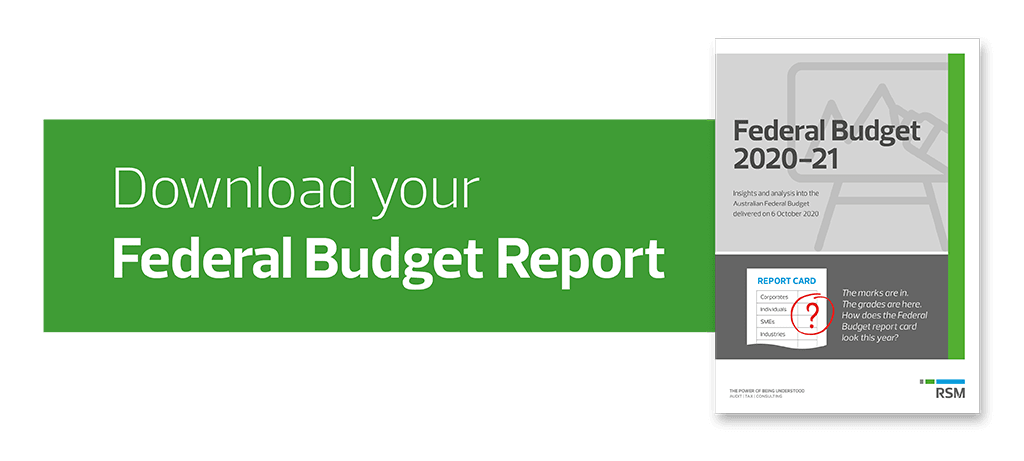What does the 2020-21 Northern Territory budget mean for you and your business?
In its 2020-21 Budget, the Northern Territory (“NT”) Government is promoting the Territory as ‘Australia’s comeback capital’ and the future economic agenda as being ‘Jobs First’.
This Jobs First approach involves: 
- Protecting existing jobs by accelerating infrastructure and encouraging short and long term investment in NT;
- Creating 35,000 more jobs through a range of small business initiatives and streamlining the development of critical industries, including a new gas precinct; and
- Preparing Territorians for the jobs of the future, such as those to be created in new sustainable industries.
Like all states and territories, the economy of NT has been adversely impacted by the once-in-a-century pandemic. However, the NT Government is projecting its return to growth to occur more rapidly than the broader Australian economy and when compared to other states and territories. To this end, the NT Government notes that while the Australian economy shrunk in FY2020 and is expected to further contract by 1.5% in FY2021, the NT economy grew by 4.8% in FY2020 and will only contract by 0.1% in FY2021. By 2023, the NT economy is expected to grow by 1.4%, significantly higher than the broader Australian economy.
The NT Government is forecasting a budget deficit of $2.45 bn in 2020-21, largely in part to a loss of GST revenue due to reduced consumer spending. This is the same story playing out across all states and territories, though it represents a harder hit to the NT Budget since GST receipts have typically been over 50% of NT’s total revenue but will be just 39% in 2020-21.
The NT Government had previously responded to these economic challenges by implementing a number of stimulus packages totalling $4 bn, including payroll tax waivers and deferrals and land tax relief measures. This Budget builds on the earlier stimulus measures with additional tax relief and small business support measures.
Key points | Economic Stimulus | Infrastructure program | Revenue measures
The key points of the Budget are: 
- Net government debt in 2020-21 is expected to be $8.4 bn, representing a net debt to revenue ratio of 132%. This is lower than the Federal Government’s net debt to revenue ratio of 149%. This is a 45% increase year-on-year in net debt when compared to 2019-20, but it expected to slow to 20% growth in 2021-22 and 8% in 2023-24.
- The NT Government will reduce government expenditure each year over the forward estimates, with total government expenditure expected to be $1 bn lower in 2023-24 compared with 2020-21. A major part of this will be a wage indexation freeze for public servants, which is to be replaced with an annual retention bonus of $1,000.
- The NT Government has expended nearly $400m in COVID-19 relief measures, with a further $120m to be spent in 2020-21. This includes $63m for quarantine facilities and upgrades to border checkpoints, $26m for additional screening and testing and $10.5m for additional police to maintain their presence at borders and in communities.
- The first measure of the Jobs First plan is the investment of $7.8m to supplement and extend the Federal Government’s JobMaker hiring credit scheme through the ‘JobMaker Booster’ scheme. In addition to the existing $200 per week payment to employers for newly eligible employees aged 16-29 and $100 per week for newly eligible employees aged 30-35, the NT Government will provide an additional $100 per week to small businesses for newly eligible employees aged 30-35 and provide $200 per week for newly eligible employees aged 36 and above (i.e., effectively, all eligible employees will give rise to a $200 per week payment).
- The total value of the NT Government’s capital works program for 2020-21 is $2.54 bn, with total infrastructure payments for the year being $1.75 bn.
Economic stimulus
The NT Government is aiming much of its business support package at small businesses, with an annual turnover of less than $10m.
Small business measures include:
- Small Business Pivot Grants of up to $10,000 to businesses to utilise new technology, equipment and improvements to access new markets;
- Small Business CX Grants of up to $20,000 to support customer enhancement projects;
- Funding of up to $250,000 to peak industry bodies to support the development of training programs specific to small businesses in their sector;
- Grants of up to $150,000 to wayside inns and roadhouses to improve their visitor experience;
- Small Business Saver Grants of up to $10,000 to assist businesses to reduce their power, water and ongoing costs; and
- Small Business Supply Chain Solver Grants of up to $10,000 to assist businesses experiencing difficulties with their supply chains.
These measures are in addition to the JobMaker Booster program.
Infrastructure program 
The NT Budget invests record amounts in infrastructure, with 60% of the program allocated to remote and regional areas.
The infrastructure budget includes:
- $597m for new and refurbished housing in cities, regional centres and remote communities;
- $90m towards projects to upgrade Kakadu and the township of Jabiru;
- $50m towards the National Aboriginal Art Gallery in Alice Springs; and
- $26m to continue the extensions of the arts trail of galleries in Arnhem Land, Katherine and Tennant Creek.
The NT Government is also providing support to 17 mining projects which are at various stages of their approval processes, with a combined proposed capital expenditure of $5.8 bn.
Revenue measures
While the Budget acknowledges a reduction in own-source revenue such as stamp duty and motor vehicle taxes, there are no substantive changes to the base or rates of these taxes.
For more information
If you have any questions or require further information on the 2020-21 Northern Territory State Budget Analysis, please contact your local RSM adviser today.


